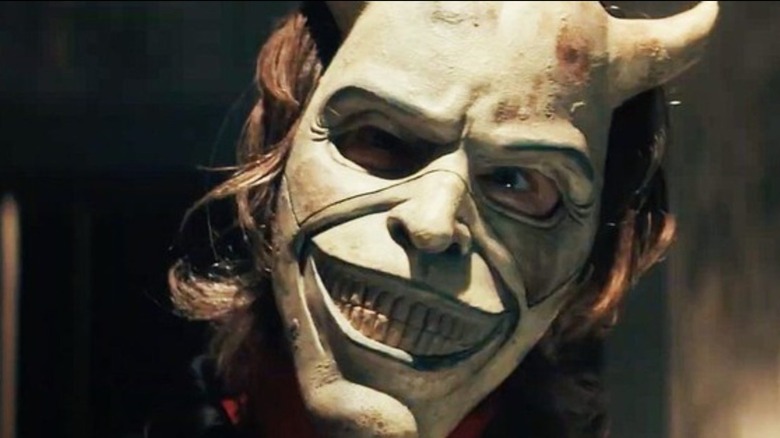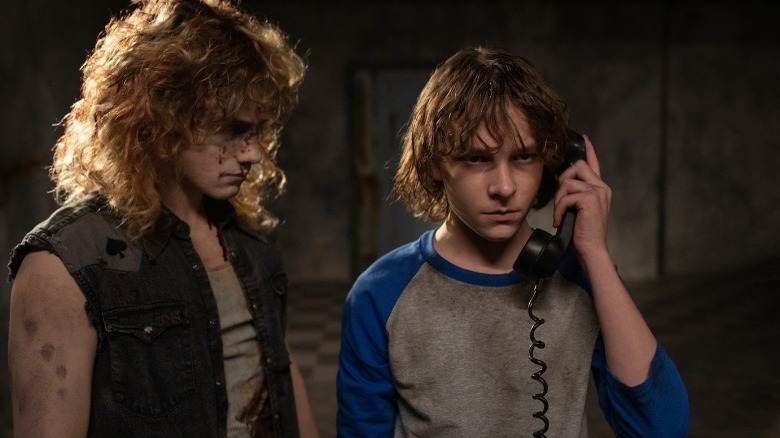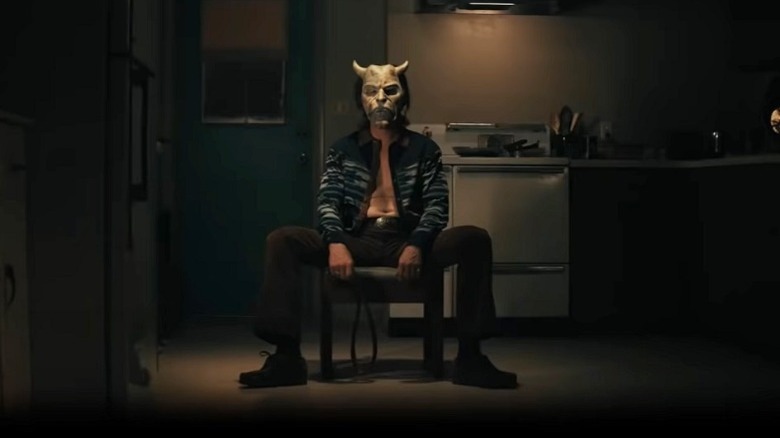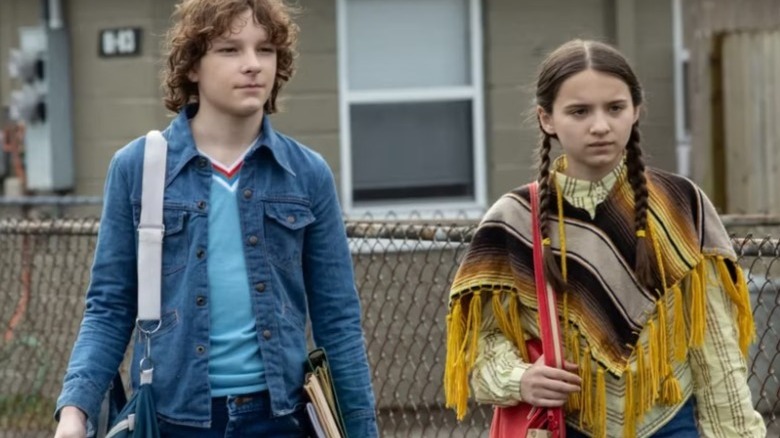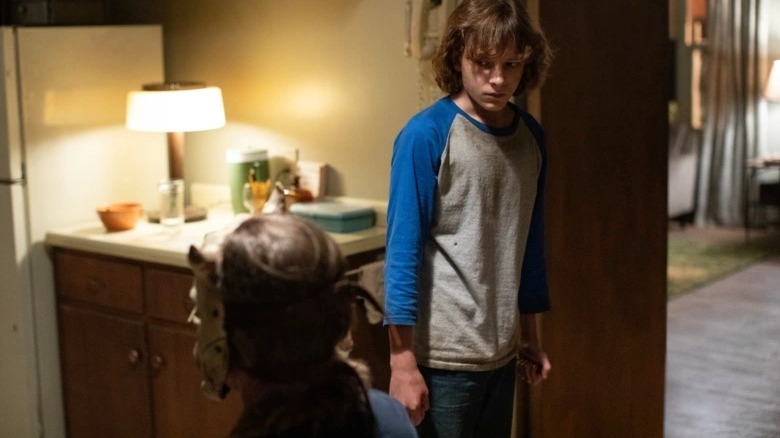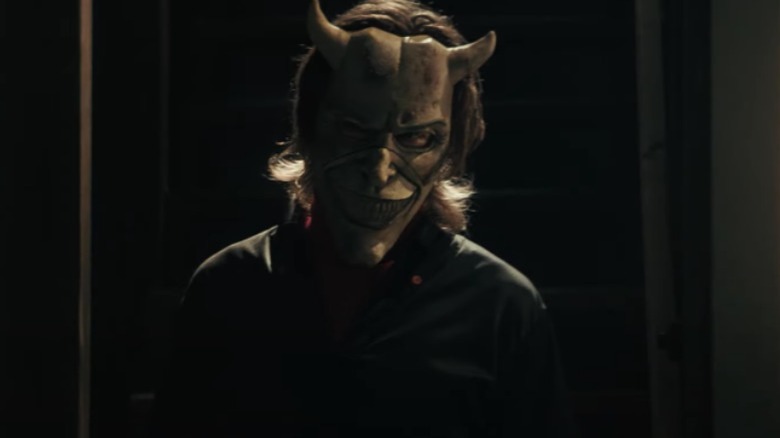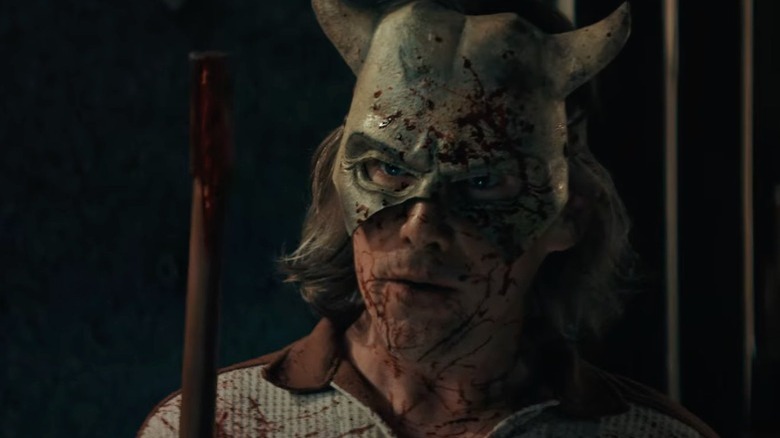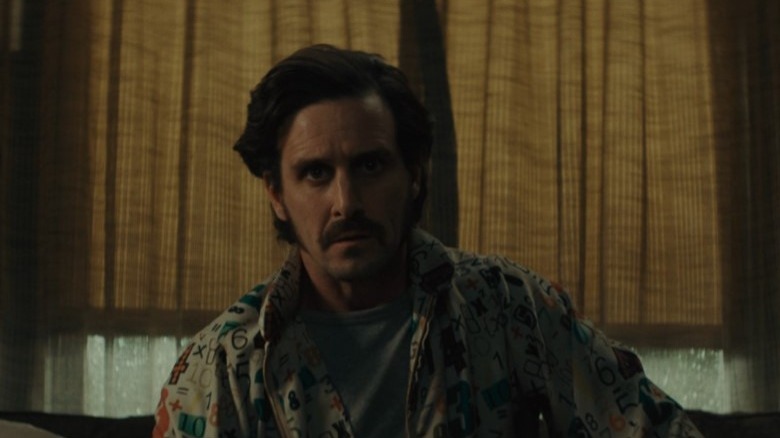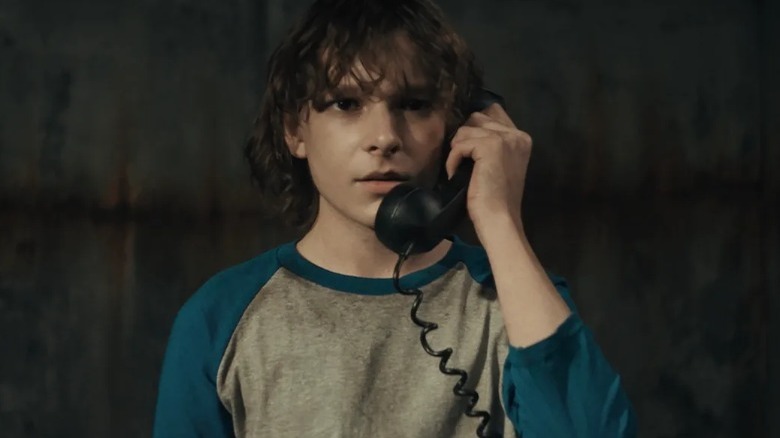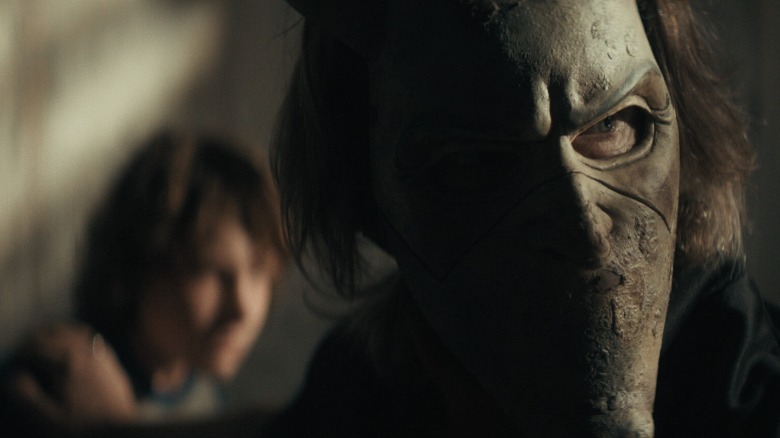Biggest Unanswered Questions In The Black Phone
Did you ever once have a sit-down with your parents or guardians and talk about stranger danger? Most of us have had the experience at some point in our youths, and it likely included warnings of stalking, luring, being grabbed — maybe even creepy vans.
There will always be a need for caution, and the brilliance of Scott Derrickson's "Black Phone" is that it effectively taps into those fears, personifying them in a creepy would-be magician/serial killer known as "The Grabber."
Ethan Hawk plays against type, portraying a haunted villain whose penchant for murder only slightly outweighs his own desire for anonymity and fetishistic ritual. He fancies himself an entertainer, but it's all a smokescreen for his real act. He derives pleasure from tormenting young boys, dangling hopes of freedom before them in their final days alive.
With help from what might be seen as a supernatural element, "Black Phone" evens the playing field between killer and potential victim. When Finney (Mason Thames) is captured and imprisoned, voices from past victims begin to call him through a mysterious black phone, providing him with encouragement and the occasional pro-tip, assisting in his struggle with the infamous Grabber.
The overarching narrative, at least to the police in the film, might feel like an open-and-shut case. But as viewers know, there are plenty of unknowns that still exist in an area of ambiguity as "Black Phone" hangs up. Delving into the film's biggest mysteries, here are some of the unanswered (and spoiler heavy) questions that remain.
What exactly is the black phone?
The question hanging over the entire film is what, exactly, is the black phone? Sure, it's a phone ... that's black. But there's obviously more to it than that.
When Finney first finds himself locked in the Grabber's basement, it seems to be just another random piece of junk lying around, no more helpful than the mattress. The Grabber is unbothered by the phone, mentioning that it hasn't worked in forever. If anything, its existence as a once-operational means of communication with the outside world is likely why he keeps it around, just to further antagonize his victims. Although, he does mention he once heard it ring — and it was static electricity.
Soon enough, Finney is alone and startled by the phone's jarring, old-school ring. From here, the film presents the phone as a conduit by which Finney is able to speak to the dead. But these aren't just any souls; he is only able to speak with the spirits of those removed from this world by the grimy hands of the Grabber.
There is a clear connection between the location, the black phone, and the boys who were likely killed in that very same basement. The Grabber likely also has some sort of connection; as the film unfolds, the Black Phone is what binds killer, prey and a haunting past.
Where was the Grabber's brother during the game of Naughty Boy?
The Grabber is one twisted individual. That much is obvious.
He roams the neighborhood snatching up young boys, locking them in his basement. The Grabber seemingly gets a kick out of tormenting his victims, but seems to have his own issues with childhood, punishment, rules and rule-breaking that were likely instilled in him at a young age. The Grabber doesn't (immediately) beat or murder his victims; he doesn't seem to be a sexual predator, either. He promises Finney that no harm will come to him, although this seems to be a promise he might make regularly, only to eventually deem his victims unworthy of continued life. He even tries to cheer Finney up with soda, and regularly feeds him.
Why go through all this trouble of feeding and caring for someone he'll just eventually kill? Well, the Grabber seems to enjoy tormenting his victims with a deranged game, where he leaves the door cracked and dangles a carrot of hope. Sitting in the kitchen, masked and holding a belt (and even occasionally dozing off), he allows his captors to think they could possibly escape. He calls the game "Naughty Boy," and it's hard for any prisoner to resist the open door; one of the spirits, however, calls to warn Finney not to fall for it, as Grabber will beat him mercilessly with the belt until he passes out.
When the Grabber starts catching up on his z's, Finney can't wait any longer. Ultimately, his escape attempt is thwarted by the dog — and he is returned to his prison. But viewers come to believe that Max (James Ransone), the Grabber's hyperactive, crime-junkie brother, is living with him unaware of his extra-curricular activities.
Where was Max when Finney made his way upstairs? How did he not hear the dog barking and the scuffle in the living room and kitchen? The end of the film offers some explanation, but nevertheless, that's a lot of noise to not overhear.
Does Finney have a gift, like his sister?
"The Black Phone" is just as much as about Finney's sister, Gwen (Madeleine McGraw), and her fight to track down and rescue her brother as it is about Finney's fight to survive. The two have a tight-knit relationship, having bonded over their mother's death and their father's brutality in the aftermath.
The two siblings really only have each other, which might be why Gwen becomes so desperate to find her brother and best friend when he suddenly goes missing. Thankfully, Gwen has a special gift that her father sees as a curse — a clairvoyance that allows her to see visions of reality in her dreams; the children's mother had a similar gift, which their father Terrence (Jeremy Davies) largely blames as part of her undoing.
Perhaps, just perhaps, there's nothing special about the black phone at all. Maybe, Finney has a similar ability to his sister, and it is manifesting itself at a traumatic time in the vessel of this broken phone on the wall of his prison. Like Haley Joel Osment in "The Sixth Sense," perhaps "The Black Phone" is actually another tale of a young man who can speak with the dead and help them with their unfinished business (stopping the Grabber).
While the film neither confirms or denies this scenario, this family's history invites such questions.
Why didn't the Grabber punish Finney for his escape attempt?
Finney takes advice from the spirits that have gone before him to heart. What other choice does he have?
The boy plots various methods of escape, first through the window at the top of the basement (by creating a makeshift lasso to pull down the grate), then by tunneling his way out of the room with the dirt beneath a loose tile; next, he learns from one of the spirits, there is a combination lock on the front door. If he can locate the sequence in the room, he can escape.
Finney discovers that the Grabber fell asleep while waiting for him to play Naughty Boy — now is his chance. Attempting to escape, he gets through the locked door and into the open — then the barking dog wakes the Grabber, who re-captures him.
But all the Grabber does is imprison the poor boy once again, then head back upstairs. The consequence for playing Naughty Boy is supposed to be punishment, and Finney got further than most. So, why are there no real repercussions to be had?
The boy seems to be a liability at this stage, and the next logical step for the killer would be to terminate him. However, he doesn't do any of these things. In fact, on multiple occasions, he mentions how he treats Finney differently. Does he have an affinity for the boy? Perhaps he sees a piece of himself in Finney? It's anyone's guess.
What happened to Finney and Gwen's mom?
Finney and Gwen have each other's backs. They recently lost their mother, literally, and their father, figuratively.
While Terrence is physically present around the house, he's frequently drunk and rarely truly there for his kids. He's too wrapped up in his own world of grief and despair. At one point, he beats Gwen just because she insists that she had visions in her dreams. Some part of Terrence wants to scare Gwen away from acknowledging her gift.
The reason for that is because the children's mother had a similar gift, but viewed it as a curse. At times it would drive her mad; she eventually took her life, and Terrence blames her clairvoyance as the reason.
But these are the only vague details gleaned from the film. How, exactly, were these gifts manifested? Was she also seeing visions involving crimes or murders? Could she talk to the dead? Was she just born with these gifts? What if her visions or communication with the dead somehow resulted in her death? There's a lot of unknowns, and if a "Black Phone" sequel is ever made, hopefully more information will be provided.
How are the police unable to nab the Grabber for so long?
The story takes place in a densely populated suburb of Denver in 1978. As the film begins, we already see that young boys have gone missing for some time. Word of the kidnapper has traveled the streets and sent neighbors, families, and children into a frenzy. The notoriety of this criminal has reached a fever pitch. By the time Finney is captured and imprisoned in The Grabber's basement, several boys have been caught and killed over the span of about a year, all in a relatively small radius.
So, how bad are the police in this area? How has The Grabber (and his creepy truck that might as well have "I'm Up to No Good" spray-painted on the side) not yet been apprehended by the police?
There are a few things the authorities do know, such as the killer's black van and the black balloons he leaves behind as some weird calling card. Eventually, even his own drug-addled brother figures it out, simply by following the news reports. He figures it out even before the police do. So, does The Grabber have other ways of alluding the authorities? Is he somehow sabotaging the investigation from the inside? It seems like there has to be some explanation for how so many crimes can go down in such a concentrated area without the authorities stopping it earlier.
Who is The Grabber?
If there's only one other thing that could possibly be more mysterious than the powers behind the black phone itself, it's the Grabber. Akin to Christopher Nolan's take on the Joker, this is a man with no reason for his actions.
Does he kidnap children simply because he can? Because he thinks he can get away with it? Does he enjoy the suffering of others? Does he really want to get caught?
These things all feel plausible, as does a completely different path. Did The Grabber suffer trauma as a young child, perhaps, even a kidnapping? Or maybe he was bullied relentlessly, which is why he chooses young victims who all seem to have a measure of angst and aggression within them. Naughty Boy might be a game to take out pent-up anger on his victims. There's plenty of possibilities here, but ultimately The Grabber is an enigma without much of a history to explain him. Perhaps, that's what makes him so terrifying.
How could Max be so oblivious?
While Max may have figured out his brother's misdeeds in the end, what took him so long?
Perhaps, the hardest truths to see might be the ones that hit closest to home. Even still, Max was obsessed with finding The Grabber, and although he was often high, he sure spent a lot of time unraveling a crime that couldn't have possibly been more under his nose.
Max is obviously following the news, right? So, that means he doesn't just know the locations where young boys went missing, but also that The Grabber drives a black van — just like the one his brother owns. Furthermore, Max never once stumbled upon his brother's creepy mask, his stockpile of black balloons or the basement itself. Additionally, his brother keeps a combination lock on the front door that is supposed to be used for bicycles (as the lock belonged to one of The Grabber's victims). That's an awfully strange way to lock your door, and Max never questions it. Was Max truly too narrow-minded in his own investigation to see what was right in front of him?
Why didn't The Grabber change the lock?
The Grabber may be a mystery, but he's also predictable. By his very nature, he's beholden to his routines. For that reason, perhaps, his serial kidnapping spree has more meaning to him than anyone initially thought. Even still, it causes him to overlook his own blunders.
For starters, he leaves Finney with the same rocket that the boy stabbed him with during his kidnapping. The Grabber also leaves a useless phone in the room with him. Well, useless to the Grabber maybe. But a possible assault weapon for Finney? Most definitely. The biggest detail from his crimes that he leaves out in the open is the combination bike lock on the front door. Finney obtains the combination, thanks to a helpful spirit, and escapes briefly in one instance before The Grabber catches up to him and detains him once again.
At that point, you might think that The Grabber would change the lock. But why didn't he? We learn that this lock actually belonged to one of the boys he had previously kidnapped and murdered. It was that boy who revealed the combination to Finney. Did he actually lock that door with the same lock when that boy was captive? He must have, since that boy knew of the lock and recorded the combination on the basement wall. So, why would the Grabber use a lock that one of his victims already knew the combination to, and his current victim just figured out? Is it out of sentimentality? It's one other detail that adds to the mystery of The Grabber and his devious ways.
What's the story behind The Grabber's relationship with his brother?
Few things in "The Black Phone" are more confused than the family dynamic going on between The Grabber and his brother, Max. For one reason or another, The Grabber allowed his brother to stay with him, even though he spends his off hours committing horrific crimes. There's a good reason why most serial killers don't have roommates, but that seems to be lost on The Grabber.
When the police canvas the area, Max invites them in and explains his theories on The Grabber's whereabouts. He mentions that he's actually from Durango but that his brother is letting him "crash here" while he's between jobs.
We don't learn much else about their relationship, other than when The Grabber claims his love for his brother after murdering him with an axe to the head. "He was an idiot," The Grabber says. "He was my idiot,"
He blames Finney for "making" him kill Max, even though it was Max who discovered his brother's basement prison. So, there's really a few major questions hanging in the balance here. Why would The Grabber allow Max to invade his deep, dark secretive world of terror? What was their relationship like? The Grabber panicked when Finney removed his mask, so, did the Grabber wear a mask around his brother? Did Max accept that there was something "off" about his brother? In a film filled with unsettling ambiguity, such questions linger.
